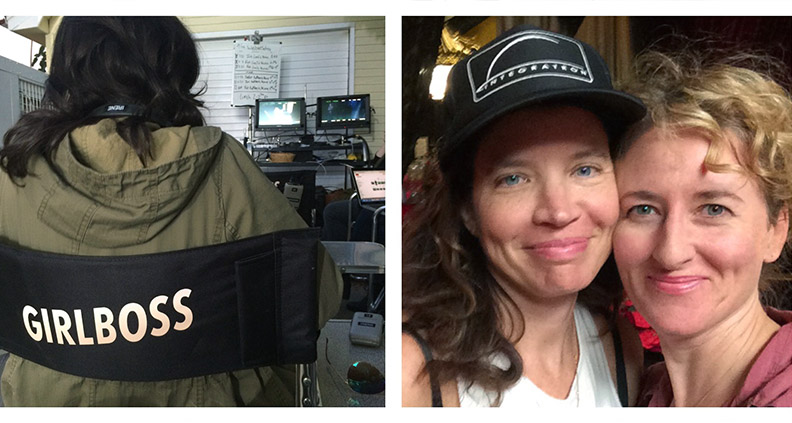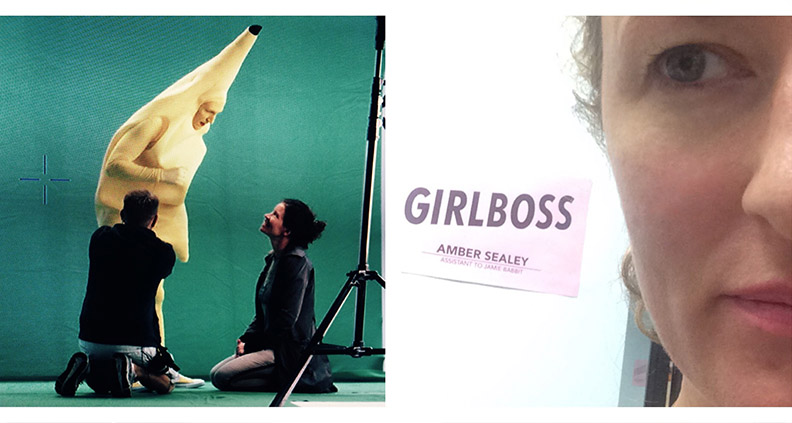Guest Post: Director Amber Sealey on Shadowing for Netflix, Gender and TV
I recently had the glorious opportunity to shadow director Jamie Babbit on the new Netflix show Girlboss (out next year), for seven weeks. Jamie directed three episodes and I was able to watch her from prep through to the edit. I was so grateful to Jamie and the Netflix/Girlboss team for welcoming me onto their set, and could not have found a more seasoned and genial person to follow than Jamie. Not to mention that everyone should get to see the lovely Kay Cannon in action—may all showrunners be as fabulous as she! So, as an experienced features director, getting into TV is the logical next step for a person like me who has preschool tuitions and a mortgage to pay. Not to mention that TV is fan-fucking-tastic right now. Who wouldn’t want in on that?
Shadowing is a great opportunity for all directors. I don’t know any director who doesn’t enjoy being on someone else’s set and watching how they do things. This was certainly the case for me with Jamie. She’s whip-smart, fast, inventive and generous with her thoughts and time. She answered every question I had, made me feel invested and welcome, and gave me the inside scoop on everything. I learned a lot and had a shit-ton of fun.
And yet, I can’t simply mention how grateful I was to be given this opportunity without also saying this: almost every female-identifying director I know has either shadowed TV or is looking to shadow for TV. And many of them are looking to shadow multiple times. I’ve even heard of one female director who shadowed full-time for twelve years until she finally got her chance to direct an episode! Yes, FULL time, and TWELVE years. I can only name one single male-identifying director I know who has shadowed—and none who are actively looking to.

That’s not to say there are not male directors who have shadowed, or who want to. I’m sure a little internet sleuthing could give me at least a few other names of men who have. But my point is: the desire/need to shadow is rampant amongst female directors, and not so rampant amongst men. Women are told this is a “box we must check” and that “it’s the only way to get considered for TV.” Maybe so, maybe so. I am a proud member of the Film Fatales, WIMPs, the Alliance of Women Directors and the LA Women’s Film Collective, and I have never been to a gathering of any of those organizations when the topic of trying to get into a shadowing program, or getting someone to let us shadow them, is not brought up. Is this happening in the Men’s Collectives? No? Oh, there aren’t men’s collectives… Never mind. I digress. But I think you see what I’m getting at: the fact that women have to organize amongst themselves and strategize about how to even audition to be considered a TV director seems a little kooky.
Admittedly, these statements are based on my own anecdotal observations and the discussions I’ve had with my fellow filmmakers. I haven’t been able to find any statistics yet about how many women vs. men are actively looking to shadow for TV right now. But it does say something that all the shadowing programs I can find online are looking to increase diversity – which includes gender, sexual orientation, race, and ethnicity. What this means to me is (and this part has been proven statistically): there are more white men directing television than there are women. So it would be only natural for women to be amongst the groups of people who are trying to get into those programs. All this is my roundabout way of saying, I think my anecdotal evidence is pretty accurate. (And yes, I am available for your next math or science problem you need quickly solved without any onerous research being done!)
And now on to the positives… My big fear before I shadowed was that there was some huge difference between directing TV and directing films that had so far been kept secret from me. But as far as I could see, the differences are quite small (except that, “Should we get an airplane for Friday? Eh, sure, why not… just to have it there in case” is not something I’ve ever heard on a film set. So, yeah, the budgets). It was a huge relief to see that things essentially were the same. Yes, you’re more of a hired hand in TV than you are on a feature set. Your role is more of cruise director, rather than auteur dictator. Of course each show is a different beast, and each showrunner has their own personal preferences on what deserves the most emphasis, but our job as director is to figure out what those differences are, and satisfy them completely. It’s a little bit therapist, a lot technician and even more of a “knowing your audience.” The thing Jamie told me that mattered the most was: don’t go over budget and don’t go over schedule, if you can help it. If you see problems coming ahead of time, let the producers know, give them options, and let them decide. Just don’t be caught off guard and surprise the producers with unexpected overages.

While wary of being yet another female director clambering to shadow on TV, I would do it again in a heartbeat. The simple truth is, watching someone else work is just too fascinating to pass up. It was hard as hell to keep my mouth shut and not offer opinions. My ego took quite a hit being the only person on set with nothing to do and no one who gave a darn who I was or why I was there. I’ve never been on a set before when I wasn’t the director or an actor, so becoming a fly on the wall was a tad unfamiliar. I took to satiating myself with the fact that I was on a set of arguably the most powerful studio in the world, watching a highly talented, radiant female director work on the show of a funny, smart and kind female showrunner. Both of these women are moms and are kicking ass in the industry. The mere fact that these women are getting to do what they do best was sustenance enough for me for those seven weeks.
And now for a small political aside: with TV being the medium through which most Americans are receiving their information these days, it is incumbent upon us to take this power seriously. We must create with ferocity; make stories that burst with diversity and difference. It’s clear now more than ever that the divide between the left and the right politically in this country is vast and deep. It feels to me now that there is no bridge strong or long enough that could unite us. But when we tuck ourselves into bed at night, our teeth brushed and our faces scrubbed clean, we all turn to those same glowing screens to feed us. I’m hoping now that those of us with the power to shape the future of this visual food that is streaming out, will hold sacred the knowledge that what we do is shaping minds, and changing lives. Let’s keep doing it for the better.
Amber Sealey is a Los Angeles-based actor, writer and director whose films include How to Cheat and No Light and No Land Anywhere, which will be released early next year. No Light and No Land Anywhere premiered as part of the LA Muse section at the 2016 LA Film Festival, and won the Special Jury award. Watch an interview with Sealey about the film here:
To learn more about Film Independent, please visit our website and subscribe to our YouTube channel. Learn how to become a Member of Film Independent by clicking here.